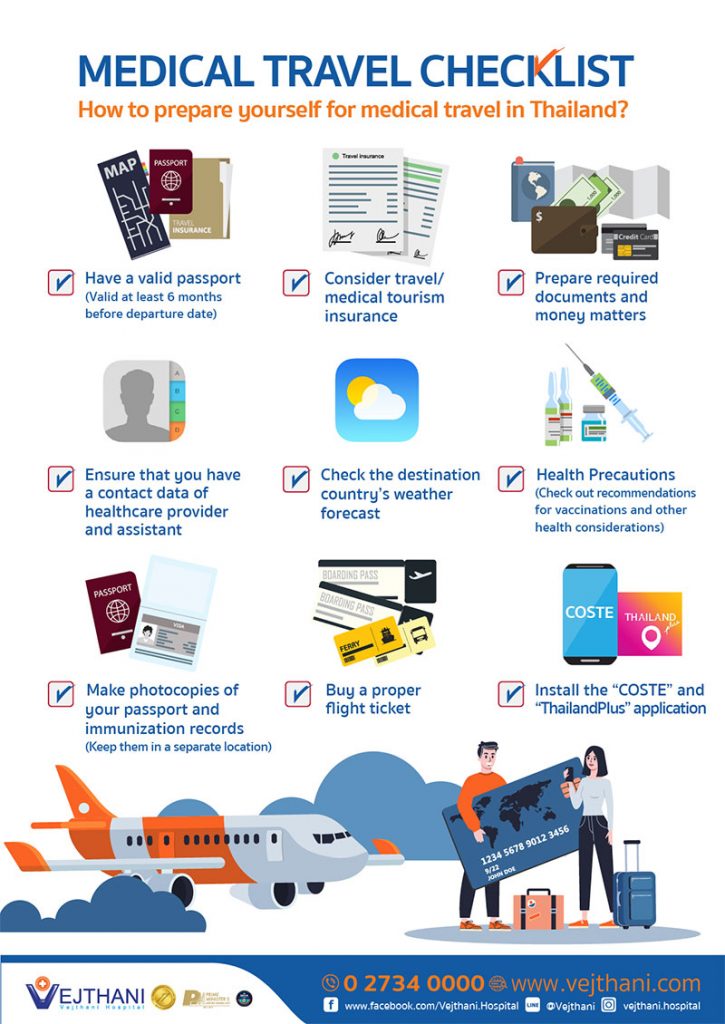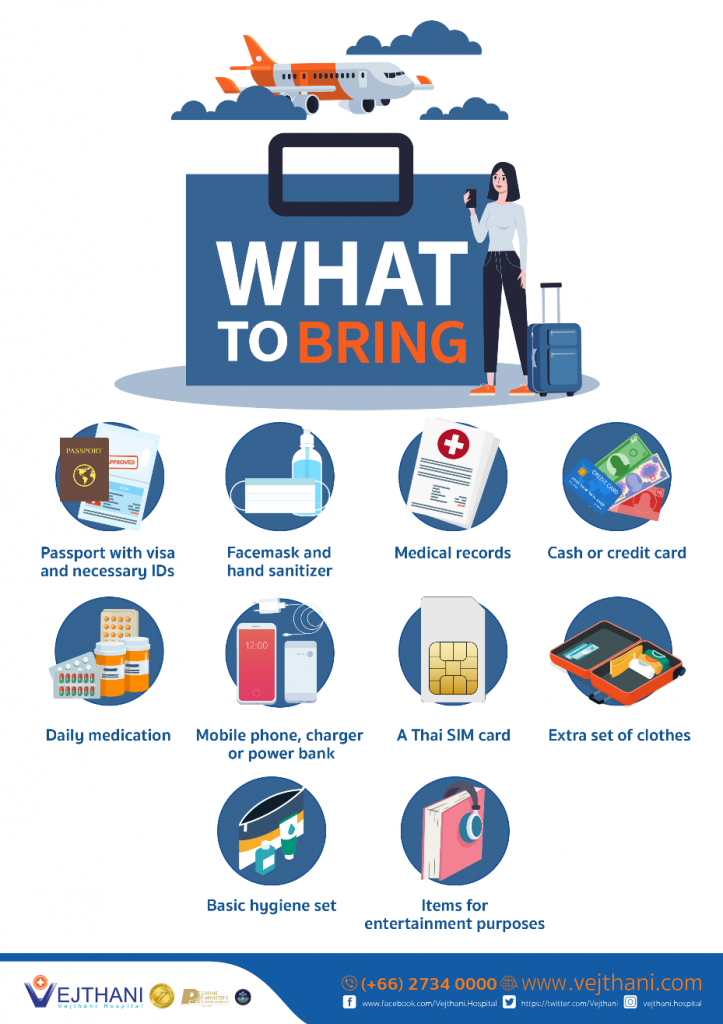Preparing for your visit
Things to pack and what to expect at Vejthani Hospital
- To get here safely, you can contact experts of Vejthani Hospital for travel guidance and services.

- Have a valid passport: Check if your passport is valid (at least 6 months before your departure date) and if you need a visa to travel to your destination country.
- Purchase travel insurance: Travel insurance protects you against unseen events, like cancelled flights, delayed flights, lost baggage, theft, etc.
- Consider medical tourism insurance: Some patients prefer to insure their medical travel for complete safety and peace of mind. Make sure the insurance you purchase covers your special medical needs.
- Prepare required documents for visa application and the certificate of entry.
- Money Matters: Whether you will pay by cash or card, make sure you have enough money and some additional cash in local currency. Before going abroad, notify your bank and credit card companies of your travel and forewarn that you are planning to make a large payment abroad as otherwise, they may treat it as suspicious and block your account and check exchange rates.
- Ensure that you have a contact data of your healthcare provider, your patient assistant, and your transport provider.
- Check your destination country’s weather forecast and prepare yourself.
- Health precautions: Keep yourself updated on recommendations for vaccinations and other health considerations, as these may be necessary for receiving a vaccination.
- Make photocopies of your passport and immunization records, and keep them in a separate location. It’s a lot easier to get a replacement of your passport if you’ve got a copy.
- Buy a proper flight ticket. Make sure someone will pick you up from the airport.
- Install the “COSTE” and “ThailandPlus” application which provide daily monitoring and tracking of COVID-19 during your stay in Thailand.
- What to bring

- Passport with visa and necessary IDs.
- Facemask and hand sanitizer to protect yourself from bacteria and viruses.
- Medical records which include copies of any laboratory tests, all diagnostic imaging results (Ultrasound, X-ray, CT-scan, MRI, etc.), old physical tests, previous discharge papers, your RH blood test, medical histories related to your medical problem, and immunization record. A medical summary is very helpful to pack in case of any emergency during your travels.
- Carry sufficient medication to last through your trip.
- Your cash or credit card.
- Mobile phone, charger or power bank with the mAh capacity according to the airline’s guidelines.
- You might want to consider bringing a neck pillow to keep your neck stable for long hours of flight and earplugs or earphones.
- Basic hygiene set such as your toothbrush, toothpaste, soap, shampoo, sanitary napkins, deodorant, toilet paper, shaving kit, etc.
- A Thai SIM card should be purchased in order to download and to register in the application called “COSTE” and “ThailandPlus”. The application provides daily monitoring and tracking of COVID-19 during your stay in Thailand.
- Items for entertainment purposes during your medical travel trip; for example books, music players, etc.
- Extra set of clothes like pajamas and your comfortable clothes (e.g. workout clothes) and sneakers just in case you need it for physical therapy if surgery is required as your treatment.
Acceptable masks at Vejthani Hospital
All patients, staff and visitors are required to wear a mask while being in Vejthani Hospital property.
Recommended and acceptable masks
Due to the growing wave of infection from the omicron variant and the urgent need to strengthen all layers of protection against COVID-19, Vejthani Hospital is asking all patients and visitors to wear surgical/procedural masks.
Patients and visitors will be offered Vejthani Hospital-provided surgical/procedural masks when they go through the screening process or when they check in. Patients with unacceptable masks, which are those with exhalation valves, neck gaiters or bandanas, will be required to wear medical-grade masks (surgical/procedural, N95 or KN-95), whether they are provided by Vejthani Hospital or patients provide them.
Recommended
- Surgical or procedural masks (tie or ear loop)
Acceptable
- N95 or KN-95 masks without vents
- N95 respirators are preferred for health care personnel during specific care activities.
- Patients or visitors arriving with an N95 mask may continue using them.
- Cloth masks
Unacceptable masks
- Masks with vents
- Why? Masks with vents or exhalation valves allow unfiltered exhaled air to escape.
- Bandanas
- Neck Gaitors




